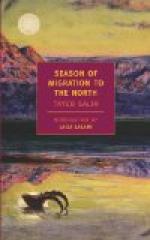[Illustration: A Family on the Lesser Slave]
Rich is the descriptive language of the North, and we lie awake on the scows, rolled in our blankets, loath to lose any of it. “Jim” is at the sweep. Many of the men are going out from the North for the first time in four or five years. They also seem too interested to slumber, and all night long the conversation goes on. A priest is describing some man who seems to be hard to identify. “You know him,—the son of the ole man with the patch on his nose wot died. I christen him last winter.” No one is more apt at naming than these men. Two days ago, at the treaty at Lesser Slave, when a smiling couple drew five dollars for a baby one day old, a Cree bystander dubbed the baby “dat little meal-ticket.” A young girl who came up to claim her money was nicknamed “Pee-shoo,” or “The Lynx,” because of her bad temper. So we see where all the old cats of the south come from.
[Illustration: A One Night Stand]
The scow glides on, and we doze, but do not sleep. In the dark she hits something and bumps us wide awake to hear the reassuring, “This is where Pat Cunningham’s horses were drownded last week.” Under Jim’s command, everybody works, even learned judges from Edmonton. He says, “Take another shot at the oars, and then you can hit the feathers.” In the morning, one half-breed fails to turn up for meat-su and the comment is, “He feels the feathers pullin’.” “Don’t blime ’im,” remarks the constable, passing the tea, “only fools and ’orses work.”
“He reached out his hand for a drink,” rendered into trans-Athabascan would be, “He got his thievin’ irons on the joy-juice,” or “He stretched his mud-hooks for the fight-water.” “He set him a-foot for his horse” means “He stole his horse,” and from this we derive all such phrases as, “He set him a-foot for his blankets,” “He set him a-foot for his furs,” “He set him a-foot for his wife.”
The springy tussocks of grass growing in swampy places are tetes des femmes, a name that pleased our fancy and made us think each time we negotiated them of walking over the swaying heads of women in a crowd. To call the tribes together, Indians are wont to send out significant little pieces of wood. The announcement in the society columns, if the Indians had any, would be, “The Crees sent out chips for a crush.” An Indian far down the Mackenzie had a name that kings might envy. He was known among his tribe as The-Man-Who-Goes-Around-and-Helps. When a beardless and ardent missionary approached this splendid chief, wanting to “convert” him to the Christian religion, the old man replied with indulgent dignity, “My son, for eighty years have I served the Great Spirit in my own way. I fear I am now too old to change.”
CHAPTER XXIV
HOMES AMONG THE YELLOW WHEAT
“The stranger that sojourneth with you shall be unto you as the homeborn among you, and thou shalt love him as thyself.”




